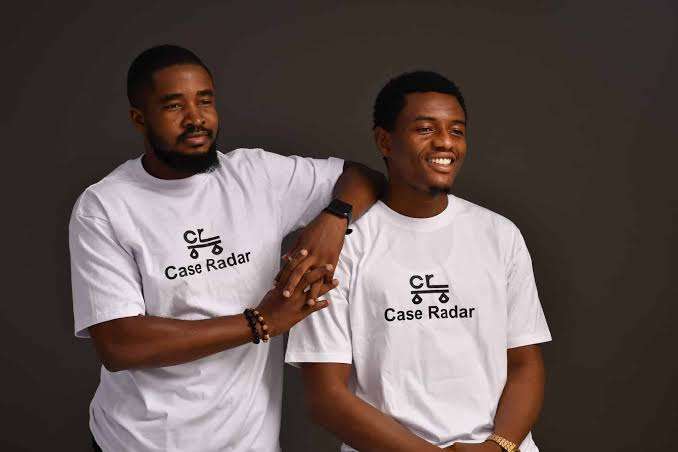Creating a high-performing AI solution is a significant challenge, especially as the field rapidly evolves. Matching giants like OpenAI and Google usually demands massive financial resources or something close to a miracle.
Despite lacking both immense funding and magical shortcuts, Agbo Obinnaya and Victory Nnaji believe they’ve developed something worth noticing.
Their AI tool, Case Radar, which went live in September 2024, has attracted more than 1,400 users and aims to educate Nigerians about legal matters, offer legal assistance, and match them with appropriate legal professionals.
The founders concede that ChatGPT offers legal insights but stress that it relies solely on information already available on the internet.
In contrast, Case Radar runs on a unique database of Nigerian court records, most of which were never published online, a bold move that major AI companies have yet to take.
OpenAI vs Case Radar
According to Obinnaya, Case Radar stands out because of its specificity, relevance to Nigeria, and its commitment to accuracy. It’s dedicated to Nigerian legal content, developed using rarely available physical court documents, and is deliberately designed to avoid fabricating responses.
“We’ve trained it to just say ‘I don’t know’ when it doesn’t know something,” Obinnaya said.
Large language models often produce incorrect answers because they struggle to acknowledge what they don’t know, a problem that Amazon CTO Werner Vogels also emphasized during a trip to Nigeria. For instance, ChatGPT may fabricate an answer rather than admit uncertainty.
This isn’t to dismiss ChatGPT’s utility. With 400 million weekly users, it ranks among the world’s top websites and is arguably unmatched in versatility. Yet, Obinnaya maintains that Case Radar is superior for Nigerian legal queries, as it’s trained on exclusive legal records unavailable elsewhere.
Transforming the legal records into digital format proved the most challenging task.
“The data was so huge that Victory had to move from Enugu to Abuja because it was too difficult to send,” he said. Victory handled the coding that enabled the extraction, organization, and formatting of the legal data for AI training.
Case Radar and Subscription
In less than 12 months, the platform has gained 1,400 users, a growth Obinnaya credits partly to his expertise in Web3 marketing. Leveraging his experience with decentralized technologies, he built both online and in-person communities to promote the product.
“Instead of just building a platform, we also decided to build communities,” he said. Obinnaya’s background as a lawyer has also shaped the product.
“We realised that when people talk about the law, they feel fear. I think it’s because they don’t understand it.”
Apart from personal observations, Obinnaya conducted a survey that revealed widespread legal illiteracy in Nigeria. At the same time, many lawyers struggle to find work.
“Every year, the Nigerian Law School calls over 5,000 lawyers to the bar, and that creates job scarcity.”
Case Radar addresses both challenges by offering legal education and linking clients to lawyers. Registration is straightforward, users sign up and start chatting, much like with ChatGPT. However, Case Radar comes with tailored legal tools, including summarizing documents, analyzing them, and helping users locate lawyers.
When prompted to describe its function, the AI replies:
“I am an AI legal assistant designed to provide accurate, detailed, and practical legal information specifically for Nigerians.”
Case Radar’s Monetization Strategy
Although it has more than 1,400 users, Case Radar’s earnings remain small, just ₦500,000 (roughly $330) since its debut. Most of this income stems from subscriptions, the main revenue stream. Users get three free sessions before choosing from hourly, daily, monthly, or yearly payment plans.
For lawyers, the pricing structure differs. They must verify their qualifications and pay a yearly fee of ₦30,000 ($20), on top of regular subscriptions.
“It’s a yearly fee for connecting them to clients,” Obinnaya explained.
Users seem largely okay with the cost, and Obinnaya says the responses so far have been encouraging. However, the limited number of paying customers might indicate a need to reassess the pricing model.
Although Case Radar’s unique training on rare Nigerian legal records is noteworthy, it’s not necessarily inimitable. With OpenAI’s tools like Custom GPTs and RAG, other developers could create similar solutions, assuming they can get the same court data. In fact, Case Radar is built using GPT technology.
What sets Case Radar apart is its convenience. It delivers a seamless user experience and specialized features that, while replicable, would require serious skill and dedication. With a team of about ten focused on tech and promotion, Obinnaya and Nnaji have created more than just a functional tool, they’ve established a recognizable brand.
However, maintaining relevance demands rapid evolution. With AI advancing at breakneck speed and most people relying on rather than developing it, the team must go beyond document digitization and continually innovate to avoid falling behind.
But growth won’t come easy. Developing AI requires capital, and aside from the founders themselves, only family members have contributed financially. Still, Obinnaya remains determined.
“The plan is to launch our mobile app, do extensive marketing, and build a massive community. We will learn in the process and keep improving,” he said.
Talking Points
Case Radar is a bold and thoughtful innovation that shows how powerful local context and ingenuity can be in solving real-world problems.
Despite limited funding and massive competition from tech giants like OpenAI, the founders, Agbo Obinnaya and Victory Nnaji have achieved something remarkable: building an AI tool specifically trained on Nigerian legal data, which directly serves the legal needs of ordinary Nigerians.
Additionally, Case Radar’s honesty programmed to admit when it doesn’t know something, sets it apart from global models that often “hallucinate” answers. This commitment to accuracy in such a sensitive field as law is commendable.
Of course, challenges remain. The revenue is still low, and while the concept is unique in Nigeria, it’s technically replicable by other developers if they gain access to similar data. But Case Radar’s success lies not just in the technology, but in its execution, local relevance, and the brand it’s building around trust and community.
In a country where legal access is often limited, Case Radar’s progress so far is more than an achievement, it’s a quiet revolution.





